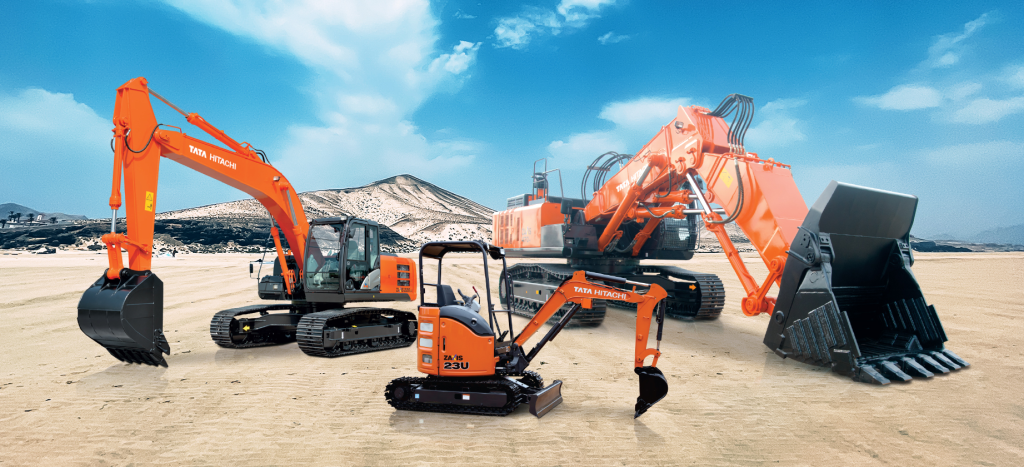Excavators are versatile machines that play a crucial role in construction, mining, and various industrial applications. With numerous types available, understanding the distinctions between them is vital for selecting the right excavator for your specific needs. This guide will provide you with essential information about the different types of excavators, their applications, and key features.

1. Mini Excavators
Overview
- Mini excavators are compact machines typically weighing under 10 tons. They are designed for small-scale projects and confined spaces.
Applications
- Landscaping
- Home renovations
- Utility work
- Small-scale digging tasks
Key Features
- Compact Size: Easy to maneuver in tight spaces.
- Versatile Attachments: Compatible with various tools like buckets and augers.
2. Standard Excavators
Overview
- Standard excavators range from 10 to 50 tons in weight. They are versatile machines used for a wide array of construction tasks.
Applications
- General construction
- Trenching
- Grading
- Material handling
Key Features
- Balanced Performance: Good combination of power and size.
- Multiple Attachments: Can be equipped with buckets, hammers, and more.
3. Large Excavators
Overview
- Large excavators weigh over 50 tons and are built for heavy-duty applications. They are ideal for extensive earthmoving and mining tasks.
Applications
- Mining operations
- Major construction projects
- Demolition work
Key Features
- High Lifting Capacity: Capable of handling significant loads.
- Powerful Engine: Designed for demanding tasks and challenging environments.
4. Crawler Excavators
Overview
- Crawler excavators are equipped with tracks instead of wheels, offering superior stability and traction.
Applications
- Construction on soft or uneven terrain
- Demolition projects
- Heavy lifting operations
Key Features
- Stability: Excellent weight distribution and traction.
- Terrain Versatility: Can operate effectively on various ground conditions.
5. Wheeled Excavators
Overview
- Wheeled excavators feature wheels, making them faster and more mobile on solid surfaces compared to their tracked counterparts.
Applications
- Urban construction
- Roadwork and paving
- Projects requiring frequent movement
Key Features
- Mobility: Easier and quicker to move from site to site.
- Speed: Faster travel on paved surfaces.
6. Long Reach Excavators
Overview
- Long reach excavators are designed with extended booms and arms, allowing for greater digging depth and reach.
Applications
- Dredging
- Demolition of tall structures
- Excavation in hard-to-reach areas
Key Features
- Extended Reach: Ideal for deep or high excavation tasks.
- Versatile Attachments: Can accommodate specialized tools for specific applications.
7. Suction Excavators
Overview
- Suction excavators utilize a vacuum system to remove soil and debris, making them suitable for precise excavation tasks.
Applications
- Utility work around existing infrastructure
- Trenching with minimal disturbance
- Environmental cleanup efforts
Key Features
- Precision: Reduces the risk of damaging surrounding structures.
- Efficiency: Quickly and effectively removes material.
8. Specialty Excavators
Overview
- Specialty excavators are designed for specific applications, such as forestry, marine work, or demolition.
Applications
- Forestry operations (e.g., feller bunchers)
- Underwater excavation
- Demolition and recycling tasks
Key Features
- Tailored Design: Optimized for niche applications.
- Custom Attachments: Often fitted with unique tools for specialized functions.
Types of excavators are Specialty Excavators Suction Excavators Long Reach Excavators Wheeled Excavators Crawler Excavators Large Excavators Standard Excavators Mini Excavators
Conclusion
Choosing the right type of excavator is essential for the success of your project. By understanding the various excavator types and their applications, you can make an informed decision that enhances efficiency, productivity, and safety. Always consider your project requirements, site conditions, and budget when selecting an excavator. If you have any questions or need further assistance, feel free to ask!